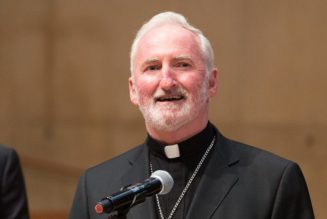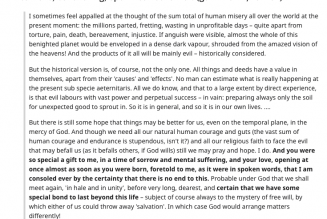Reactions are emerging around the world to Monday’s declaration from the Vatican’s doctrine office on “the possibility of blessing couples in irregular situations and same-sex couples.”
The 5,000-word document Fiducia supplicans caused immediate controversy when it was issued Dec. 18 because it gave the green light, with caveats, to the “spontaneous” blessing of couples in unions other than marriage.
Here’s a brief guide to who’s saying what, by country:
Austria 🇦🇹
Asked how priests should respond to a same-sex couple’s request for a blessing, Archbishop Franz Lackner replied: “Basically, one can no longer say no.”
Commenting on why the declaration was issued, the president of Austria’s bishops’ conference said: “I believe that the Church recognizes that a relationship between two of the same sex is not entirely without truth: there is love, there is loyalty, there is also hardship shared and lived in faithfulness. This should also be recognized.”
Belgium 🇧🇪
Antwerp’s Bishop Johan Bonny, who encouraged participants in Germany’s synodal way to endorse a resolution on same-sex blessings in March, welcomed the declaration.
“It helps us move forward,” he said, according to Belgium’s De Standaard newspaper.
England 🏴
The group LGBT+ Catholics Westminster in London, England, said it was delighted to receive “this welcoming, Christmas gift from the Dicastery for the Doctrine of the Faith and Pope Francis.”
“This is a massive step forward in the recognition and acceptance of all who seek a blessing for their loving and committed relationships,” it commented.
France 🇫🇷
Archbishop Hervé Giraud said that the declaration should be read in the light of Pope Francis’ 2016 apostolic exhortation Amoris laetitia, “which already affirmed the idea that, when a union reaches visible stability, it can be an opportunity to be accompanied by the Church.”
“Pope Francis is trying to move away from the simple ‘permit-prohibit’ to place people under God’s gaze in order to lead them back to safer paths. Blessing opens these safer paths,” the Archbishop of Sens-Auxerre told La Croix.
“Until now, the debate in the Church has been between those who say you can bless the person but not the couple, and their opponents. With this note, the pope goes further: he asks that we take into account people’s situation, to encourage them to live better Christian lives.”
Giraud said that the document would likely receive a mixed reaction.
“Some will welcome it as a first step, while others — who were calling for the blessing of civil unions, for example — will feel that it doesn’t go far enough,” he said.
“Behind these small steps lies the Church’s concern for communion, because some lay people and clerics are opposed to any change on the subject, so we need to go very slowly and do a lot of teaching on the meaning of what’s at stake: God wants to take us from where we are to lead us to him.”
Germany 🇩🇪
Bishop Georg Bätzing, the chairman of the German bishops’ conference, said he was grateful for the declaration’s “pastoral perspective.”
“The declaration Fiducia supplicans addresses the issues that have become apparent in the recent past around the topics of requests for blessing and blessings from a pastoral perspective and in a theologically moderate and calm language,” the bishop said in a Dec. 18 statement.
“The declaration applies theological categories and terms in a responsible manner. It draws a clear line between unwavering fidelity to the teachings of the Church and the pastoral requirements of an ecclesial practice that wants to be close to people. A pastoral scope for action is described here, which illustrates responsible Church practice.”
Irme Stetter-Karp, president of the influential lay Central Committee of German Catholics (ZdK), said that she was both “happy and surprised” by the document.
Referring to priests and lay pastoral workers who have long blessed same-sex couples in Germany, she said: “It turns out that theological honesty and a sense of faith are important milestones on the way to changing the Church. Mere obedience to prohibitions is not Catholic.”
Ivory Coast 🇨🇮
Fr. Joseph Loïc Mben, S.J., a Cameroonian teacher at the Jesuit Institute of Theology (ITCJ) in Abidjan, the Ivory Coast, suggested that the text was an initial response to an emerging issue.
“I think it’s necessary to make it clear that this text is a statement that represents the official Church’s first position on a new situation,” he wrote in a 1,200-word analysis published by La Croix Africa.
“It is not, therefore, a definitive opinion on the matter. It can be treated as a prudential judgment, which simply implies taking note of it, even if we don’t necessarily agree with the details expressed.”
Mben said that the call to bless irregular relationships could risk giving “the impression of normalizing so-called irregular situations.”
“In Africa, the possibility of same-sex couples seeking a blessing will be rather rare,” he said. “Irregular situations mainly concern heterosexual couples: cohabiting couples (transitional or permanent), divorced couples, couples who are only civilly married, and polygamous households.”
“Given that no one should be excluded, does this mean that all situations should be blessed? It should be made clear that this does not include situations that are criminally reprehensible (incest, pedophilia) or humanly untenable.”
Kazakhstan 🇰🇿
A Dec. 19 statement signed by Archbishop Tomash Peta and Bishop Athanasius Schneider — respectively the head and auxiliary of the Archdiocese of Saint Mary in Astana, Kazakhstan — argued that the text endorsed practices that contradicted “Divine Revelation and the uninterrupted, bimillennial doctrine and practice of the Catholic Church..”
“As successors of the Apostles, and faithful to our solemn oath on the occasion of our episcopal consecration ‘to preserve the deposit of faith in purity and integrity, according to the tradition always and everywhere observed in the Church since the time of the Apostles,’ we exhort and prohibit priests and the faithful of the Archdiocese of Saint Mary in Astana from accepting or performing any form of blessing whatsoever of couples in an irregular situation and same-sex couples,” they said.
“It goes without saying that every sincerely repentant sinner with the firm intention to no longer sin and to put an end to his public sinful situation (such as, e.g., cohabitation outside of a canonically valid marriage, union between people of the same sex) can receive a blessing.”
Malawi 🇲🇼
The Episcopal Conference of Malawi issued a Dec. 19 “clarification.”
“The declaration is NOT about the blessing of same-sex unions and sacramental endorsement of the same as married couples,” it stressed.
It underlined that, “to avoid creating confusion among the faithful, we direct that for pastoral reasons, blessings of any kind and for same-sex unions of any kind, are not permitted in Malawi.”
The Philippines 🇵🇭
Archbishop Socrates Villegas issued “episcopal guidance” Dec. 19 on the declaration’s implementation in his Archdiocese of Lingayen-Dagupan in the Philippines.
In the 700-word statement, he reflected on what it means “to say that a Catholic priest blesses a couple in a cohabitating relationship or a polygamous bond or a same-sex union.”
He distinguished between three types of blessing: an invocation to God, a “blessing of sanctification,” and a “blessing of mercy.”
He said that “when a Catholic priest prays a blessing of mercy on a couple in an irregular situation, who ‘desire to entrust themselves to the Lord and his mercy, to invoke his help, and to be guided to a greater understanding of his plan of love and of truth’ (no. 30), he is asking God to have pity on both of them and to give them the grace of conversion so that they can regularize their relationships.”
He added that the “blessing of mercy” cannot be “a blessing of sanctification since we cannot ask God to bless something that, as Fiducia supplicans explains, is not ‘conformed to God’s will, as expressed in the teachings of the Church’ (no. 9).”
“Priests who are invited to bless couples in irregular situations should choose the appropriate words to reveal this intent of the Church,” he said.
Spain 🇪🇸
In a Dec. 18 post on twitter.com, Bishop José Ignacio Munilla said that “pastoral charity is a call that all sinners may be blessed, but not to bless our sin.”
The Bishop of Orihuela-Alicante, in southeastern Spain, added that “the Gospel invites us to bless all those who open themselves to the gift of God, including those who live in irregular affective situations; while it does not grant us any power to bless their unions that are contrary to God’s plan.”
Switzerland 🇨🇭
In a Dec. 19 statement, the Swiss bishops’ conference said that the declaration corresponded “to the Swiss bishops’ desire for an open Church that takes seriously, respects, and accompanies people in different relational situations.”
It linked the document to October’s synod on synodality in Rome and Pope Francis’ exhortation Amoris laetitia.
“The declaration Fiducia supplicans testifies that the Church offers a place to all human beings. The bishops are aware that such a Church presupposes acceptance and mutual respect,” it said.
“The discussions under the guidance of the Holy Spirit that took place this year as part of the synod on synodality open up a horizon on this subject.”
“With the declaration just published, the Church bears witness to the fact that it perceives and takes seriously the synod’s concerns, and that it consistently assumes its mission of pastoral accompaniment of every human being, in continuity with the apostolic exhortation Amoris laetitia.”
United States 🇺🇸
Bishop Andrew Cozzens said in an 800-word Dec. 18 statement that Fiducia supplicans was clear that its provisions do not represent “in any way a change in the Church’s teaching about marriage.”
“Although it is impossible for us to bless a same-sex union, since any sexual union outside of the marriage of one man and one woman is contrary to the Gospel, we may bless individuals who are not yet living in full accord with the Gospel, even those in a same-sex union,” said the Bishop of Crookston, Minnesota.
“This is not a marriage blessing and should never be done in a liturgical or ceremonial way which would give the false idea of blessing a union contrary to the Gospel.”
Chicago’s Cardinal Blase Cupich said Dec. 18 that the declaration called for “a pastoral approach, for the Church, as a loving mother.”
“Here in the Archdiocese of Chicago, we welcome this declaration, which will help many more in our community feel the closeness and compassion of God,” he commented.
Bishop John Folda of Fargo, North Dakota, noted Dec. 19 that blessings for couples in irregular situations and same-sex couples “are not to be confused with marriage or any liturgical rite, and may be given not to legitimize an irregular relationship, but to offer God’s grace and assistance to all who seek his healing love.”
“The pastors of the Church will continue to study this initiative and how it may affect their ministry to God’s people,” he wrote.
Archbishop Bernard Hebda said in a Dec. 18 statement that the declaration fitted well into the spirit of Advent.
The statement, approved by Pope Francis, reminds us that all of us are loved by God, and that we all are in need of God’s mercy and would benefit from his blessing as we strive to live out his call more perfectly” said the Archbishop of Saint Paul and Minneapolis.
He said that the Vatican document was “intended to offer nuance to the Church’s teaching on blessings without in any way changing the Church’s perennial teaching on marriage or on sexual morality.”
“The blessings do not imply that the Church is officially validating the status of the couple,” he wrote. “Effort is particularly to be taken, moreover, to make sure that such blessings are not confused with the sacrament of marriage.”
“Nevertheless, the hope is that these blessings can assist those who request them to ‘open their lives to God, to ask for his help to live better, and also to invoke the Holy Spirit so that the values of the Gospel may be lived with greater faithfulness.’”
Bishop Edward Scharfenberger of Albany, New York, emphasized in a Dec. 19 statement that the document “does not change the teaching of the Catholic Church on the nature of marriage.”
“We are all called to follow God’s commandments, and this is a life-long journey of conversion and growth by God’s grace and love,” he wrote. “This is why the pope also urges us not to ‘lose pastoral charity, which should permeate all our decisions and attitudes’ and to avoid being ‘judges who only deny, reject, and exclude.’”
Scharfenberger added: “God’s goodness and will is always to make us holy. Our disposition must be to realize our absolute need for God’s love and grace, joyfully receiving God’s blessing, so we can become holy.”
Bishop David Walkowiak of Grand Rapids, Michigan, said that the declaration “reminds us that the Spirit is always drawing us closer to the Lord.”
“These spontaneous, private prayers and blessings are given routinely. They are nothing new,” he said in a Dec. 18 statement. “The declaration reaffirms an appropriate pastoral response to people who express a request for these prayers.”
The U.S. bishops’ conference issued a brief statement Dec. 18, stressing that “the Church’s teaching on marriage has not changed, and this declaration affirms that, while also making an effort to accompany people through the imparting of pastoral blessings because each of us needs God’s healing love and mercy in our lives.”
The Vatican 🇻🇦
In a Dec. 18 editorial published by Vatican News, Andrea Tornielli reflected on the merciful quality of “the shepherd’s heart.”
“The origin of the declaration is evangelical,” wrote the Dicastery for Communication’s editorial director. “On almost every page of the Gospel, Jesus breaks traditions and religious prescriptions, respectability, and social conventions. He performs actions that scandalize the self-righteous, the so-called ‘pure,’ those who shield themselves with norms and rules to distance, reject, and close doors.”
Wales 🏴
Archbishop Mark O’Toole urged Catholics in his Archdiocese of Cardiff and the Diocese of Menevia to “read and reflect” carefully on Fiducia supplicans.
“I pray that this declaration will encourage all of us to show ever more clearly that the Church is a loving mother, who desires to bring the closeness and compassion of God to all His children,” he said in a Dec. 19 statement.
“May it give consolation and encouragement to those who seek the Father’s blessing, to draw closer to Him, and to discover more deeply the beauty of His Son Jesus, in the life of our holy mother, the Church.”
Comments 18
Services Marketplace – Listings, Bookings & Reviews










